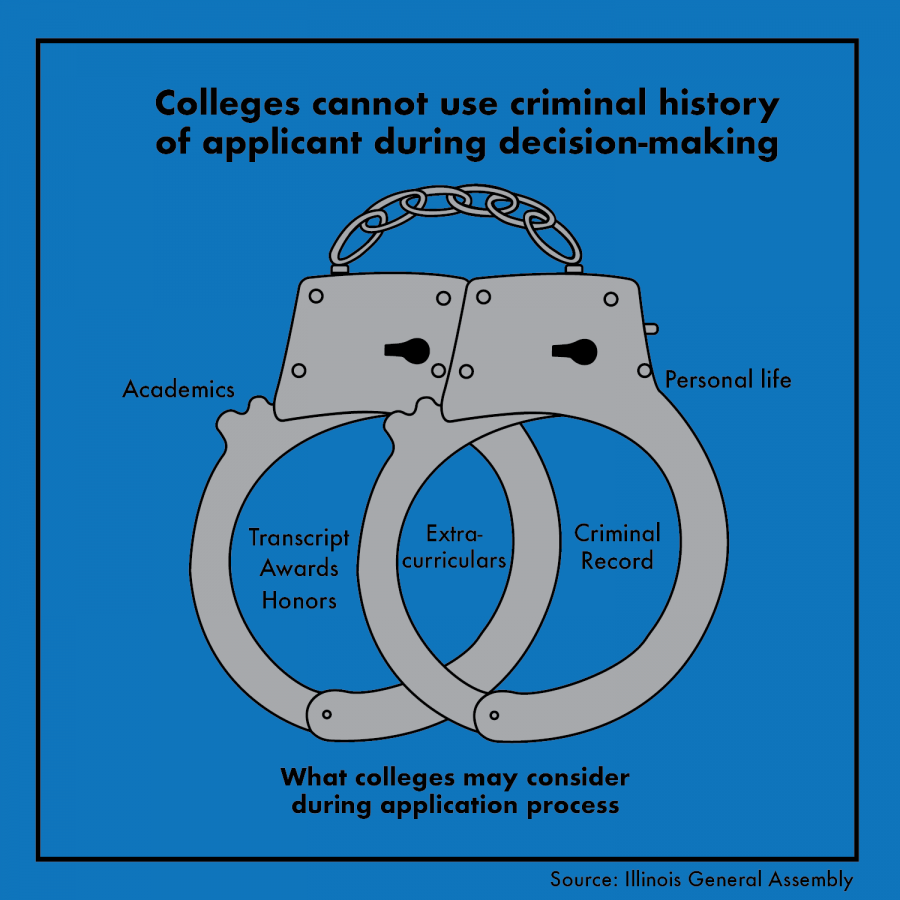Criminal history bill subject to change college applications
Apr 18, 2019
A new Illinois bill may prevent colleges within the state from asking incoming students about their criminal history on college applications.
The Criminal History in College Applications Act, also known as HB0217, seeks to change how colleges request specific information on student applications.
The Illinois General Assembly specifies that information of recent criminal history, not limited to records of arrests and detentions, criminal charges or indictments and convictions, should be excluded from college applications.
Julian Parrott, assistant vice president for academic affairs of the University of Illinois System, said in an email the University does require students to check a box if they have been convicted or charged of a crime.
“It is rare for us to deny admissions based on self-reported criminal history,” Parrott said. “Currently about 1% of the applicants who check Urbana’s box are denied admission based on their criminal information.”
Get The Daily Illini in your inbox!
Andrew Borst, director of the Office of Undergraduate Admissions, said in an email there are two reasons the Criminal/Disciplinary History Review committee recommends denial.
One way is if the student denies having a criminal or disciplinary history. The other is if the criminal history of the applicant presents a substantial risk of harm to the Champaign-Urbana community.
“Universities across the country face increased pressure/obligation to maintain a safe environment for its students from acts of violence,” Borst said.
Tauren Nelson, senior in LAS, said this bill would allow many disadvantaged students an opportunity to receive higher education.
“I am in favor of this bill because it is an attempt to decrease barriers to higher education for those with criminal histories,” Nelson said. “This bill may also yield greater racial diversity with each incoming class.”
The safety of other students on college campuses is the main concern for many of those who have heard about the Criminal History in College Applications Act.
“Student safety is a high priority for all institutions of higher education, so we all would be concerned if our options for exercising due diligence around campus safety were diminished,” Parrott said.
However, Nelson said those with criminal histories should not be labeled as a criminal their entire life.
“The administration should allow those with felonies to receive a valuable education, just like students without felonies,” Nelson said. “There have been students with no documented criminal history on campus that perpetuate crime, an example of which is sexual assault.”
Dean Vikram Amar in Law said in an email that for certain programs students are required to check the box, regardless if the bill is passed.
“I think it has some virtues, but units like law schools and med schools, which have to certify graduates for eligibility to be admitted to the bar or to prescribe drugs, cannot reasonably be subject to such measures,” Amar said.
Amar said there may be an increase in the number of people with criminal records who apply, but were formerly deterred from applying for fear their records would be disqualifying.
With the bill still under consideration, many students will have redemption with continuing education and overcoming barriers within society.
“The language in the bill would have changed our process for 2020 with the application going live in September,” Borst said. “I think we will continue to debate this issue in future years.”
Nelson said students not having to check the box about their criminal history could have better social, personal and professional development in their lives.
“Removing barriers to higher education with HB0217 may alleviate the stigma and discrimination that individuals experience from having criminal histories,” Nelson said. “Which is oftentimes because the environment lacking in access and resources was not conducive to economic and social mobility.”






